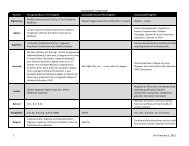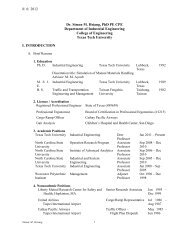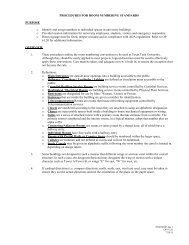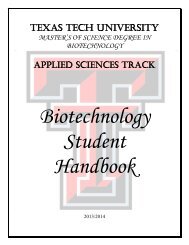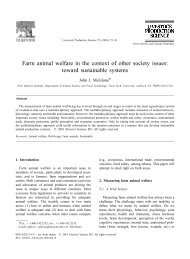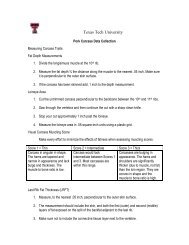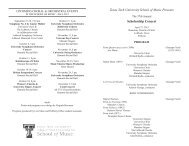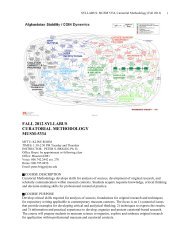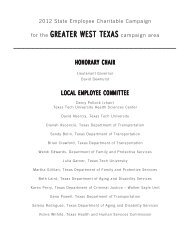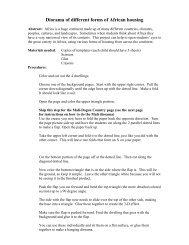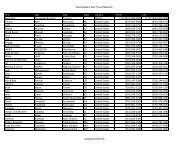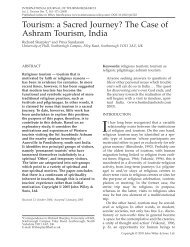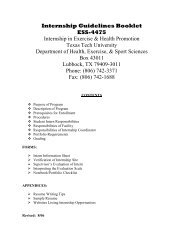Development of Tour Uriely 2005
Development of Tour Uriely 2005
Development of Tour Uriely 2005
Create successful ePaper yourself
Turn your PDF publications into a flip-book with our unique Google optimized e-Paper software.
200 THE TOURIST EXPERIENCE<br />
this paper. Instead, the focus here is on identifying and evaluating<br />
major developments in the conceptualization <strong>of</strong> the experience. Specifically,<br />
by reviewing relevant literature across various topics, including<br />
the definition <strong>of</strong> the tourist role, typologies, authenticity, postmodern,<br />
and heritage tourism, four developments emerge: a reconsideration <strong>of</strong><br />
the distinctiveness <strong>of</strong> tourism from <strong>of</strong> everyday life experiences; a shift<br />
from homogenizing portrayals <strong>of</strong> the tourist as a general type to pluralizing<br />
depictions that capture the multiplicity <strong>of</strong> the experience; a<br />
shifted focus from the displayed objects provided by the industry to<br />
the subjective negotiation <strong>of</strong> meanings as a determinant <strong>of</strong> the experience;<br />
and a movement from contradictory and decisive academic discourse,<br />
which conceptualizes the experience in terms <strong>of</strong> absolute<br />
truths, toward relative and complementary interpretations.<br />
The current analysis suggests that these changes in conceptual<br />
trends involve a change in the style <strong>of</strong> academic theorizing. The conceptualizations<br />
derive from various theoretical frameworks, including<br />
phenomenology (Cohen 1979; <strong>Uriely</strong>, Yonai and Simchai 2002), a<br />
neo-Durkheimian perspective (MacCannell 1973), G<strong>of</strong>fmanian roletheory<br />
(Wickens 2002), conflict and cultural criticism (Barthes 1972;<br />
Boorstin 1964; Turner and Ash 1975), and a constructivist narrative-oriented<br />
approach (Elsrud 2004), but without attempting to endorse any<br />
<strong>of</strong> them. Instead, these are characterized and evaluated hereafter<br />
according to another theoretical construct, that <strong>of</strong> the distinction between<br />
‘‘modernist’’ and ‘‘postmodernist’’ forms or styles <strong>of</strong> academic<br />
knowledge (Bauman 1987, 1992; Denzin 1991; Flax 1990; Frazer<br />
1989; Hollinshead 2002; Ryan 2002; <strong>Uriely</strong> 1997). In line with this distinction,<br />
it is argued that while the early theories comply with the<br />
notion <strong>of</strong> modernist academic knowledge, contemporary conceptualizations<br />
<strong>of</strong> the same correspond to postmodernist modes <strong>of</strong> analysis.<br />
TOWARD POSTMODERNIST CONCEPTUALIZATIONS<br />
As a broad cultural phenomenon, postmodernity refers to a particular<br />
set <strong>of</strong> generalized developments that may constitute a new cultural paradigm<br />
and social consciousness (Lash and Urry 1987; Rojek 1995; Urry<br />
1990). However, postmodernity is also associated with diverse interrelated<br />
phenomena that developed after World War II in varied spheres<br />
<strong>of</strong> activity, such as art, architecture, sports, politics, cinema, tourism,<br />
and science (Denzin 1991). Accordingly, the term is utilized by scholars<br />
who grasp contemporary trends in tourism as manifestations <strong>of</strong> postmodernist<br />
rather than modernist culture (Baudrillard 1983; Eco 1986;<br />
Featherstone 1991; Fjellman 1992; Lash and Urry 1994; Munt 1994; Pretes<br />
1995; Rojek 1995; Urry 1990). Similarly, the notion <strong>of</strong> ‘‘postmodernist<br />
academic knowledge’’ or ‘‘postmodernist modes <strong>of</strong> theorizing’’ is<br />
utilized by those who perceive recent developments in the social sciences<br />
as reflection <strong>of</strong> postmodernity (Bauman 1987, 1992; Denzin 1991; Flax<br />
1990; Frazer 1989; Hollinshead 2002; Ryan 2002; <strong>Uriely</strong> 1997).<br />
Postmodernist forms and modes <strong>of</strong> theorizing are associated with a<br />
variety <strong>of</strong> characteristics, including deconstruction, subjectivity, skepti-



